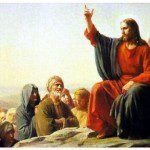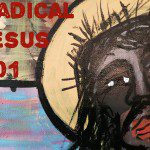We continue our journey through the book of Ephesians at the Wednesday morning Lamb Center Spanish Bible study. This week we covered Ephesians 2:11-22, where Paul talks about how Christ has destroyed the dividing wall between Jews and Gentiles. Of course, the first thing that comes to mind as a privileged white person doing a Bible study with Hispanic homeless guys are all the cultural and socioeconomic walls that separate me from them. But that topic never really came up and it really didn’t need to.
There were five of us today: myself; Maritza, the wife of Medardo Serrano, who pastors the Hispanic congregation that meets at Burke UMC; Rubelio, the man who thinks he might be called to be a street preacher and can talk for 5 minutes without taking a breath; Jonny, a new guy who knows the Bible backwards and forwards but talks very softly so I understand about 10% of what he says; and Orlando, who shared that he’s from El Salvador but said very little.
It’s amazing what a difference the dialect makes in understanding the language. Some flavors of Spanish I understand very well. I was really struggling today. As I’ve shared before, Rubelio talks a whole lot with a very strong sense of authority. I recognize most of the Biblical references that he makes, though I’m not always sure if the implications that he draws from them are orthodox, so I always debrief with Maritza afterwards to make sure I didn’t agree to any heresy (so far, so good). It seemed like Rubelio may have been a little bit threatened at first by Jonny because Jonny was making intertextual connections like crazy, flipping through his Bible to verses that related to our topic. One thing that’s been astonishing to me (and perhaps shouldn’t be) is how Biblically literate these guys have been. They have it memorized to such a higher degree than most of the people in the world that I’m used to.
In any case, one of the images we contemplated is the concept of Jesus being our piedra angular (cornerstone) as it says in Ephesians 2:20. We then talked about how Jesus becomes a tropiezo (stumbling block) for Christians who don’t make Him their cornerstone. This kind of connected to the question of circumcision raised in 2:11-13. I talked about how many Christians today try to find marcas to legitimize their Christianity, in the same way that circumcision was the marca of Judaism, rather than trusting purely in the sangre de Cristo that circumcises our hearts as Christians. I have blogged about the need to be perpetually converted from works-righteousness to justification by faith. I shared with the group that many times I catch myself looking for marcas in my own spiritual life that prove I’m a better Christian than those other Christians whose ideologies I disagree with. Every time I do that, Jesus becomes the tropiezo that I trip over. I guess you have to stub your toe quite a few times before you just let Jesus become your piedra angular.
Of course, it’s also important not to falsely individualize what is clearly a communal image in Ephesians 2:19-22. Jesus is our piedra angular as the household of people who have put our trust in Him. One of the things that really hit me as I was reflecting on Rubelio’s long-windedness is that he probably doesn’t get to talk to a lot of people during the week whether he’s out on the street or in a homeless drop-in center with mostly English speakers. Because Rubelio has Christ as a piedra angular, he has a dignity that no patronizing middle-class white pastor can take away from him. It’s because of this dignity that when we take up joys and concerns, he asks us to pray for his sabiduria (wisdom) above all else. Rubelio explained that God offered to give Solomon all things and Solomon chose sabiduria.
Rubelio is a witness to me that the “household” of God that Paul names in Ephesians 2:19 really does exist; it’s not just a metaphor. When I tried to ask him today what country he was from, he refused to answer, saying, “Yo soy de la union de Dios” (I am from the union (?) of God). I have a feeling that if you asked him whether he was homeless, he would say no, because he lives in the household of God built on the piedra angular de Jesucristo.










